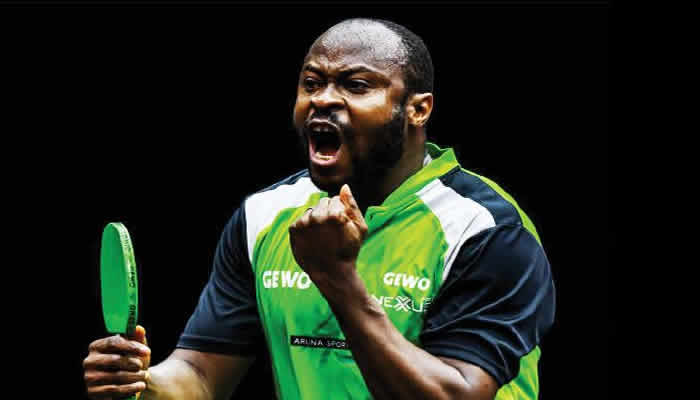At the 2024 China Smash tournament, first-round exits for both Nigerian Quadri Aruna and World No. 1 Wang Chuqin have sent shockwaves through the table tennis community. The event, featuring a hefty prize pool of $2 million, takes place from September 26 to October 6 at Shijingshan Shougang Park. Aruna, ranked 19th globally, faced Swedish player Anton Kallberg, ranked lower at 24th. Despite a strong start, with a win in the round of 64 against Finland’s Benedek Olah, Aruna was unable to maintain the momentum, ultimately losing to Kallberg in a hard-fought match with scores of 11-4, 6-11, 11-8, and 11-9. This early exit not only marks a disappointing turn in Aruna’s campaign but also illustrates the unpredictable nature of the sport.
Similarly, Wang Chuqin’s hopes of securing yet another title were dashed as he fell to Anders Lind in the same round. An established star who had claimed victory at recent Grand Smash events in Singapore and Saudi Arabia, Wang was heavily favored entering the match. However, Lind brought a fierce competitive spirit and strategic play, prevailing in a tense battle that ended 3-1 with scores of 13-11, 9-11, 11-6, and 11-7. Both players had faced each other before in the quarterfinals of the previous year’s World Championships, where Wang emerged victorious. Nevertheless, Lind seemed rejuvenated and ready to defy the odds. The fans, who anticipated continuing Wang’s winning streak, watched in disbelief as the match unfolded.
Anders Lind’s approach seemed revolutionary; he adopted unconventional tactics, adjusting his game to disrupt Wang’s rhythm. Realizing that following a standard playstyle would likely result in defeat, Lind devised a plan to employ unpredictable spins and serve techniques to force errors from the Chinese champion. “I just tried to make it very weird for him,” Lind shared, highlighting his shift away from typical strategies that would have played into Wang’s strengths. His method proved effective, with Lind’s backhand counters and creative forehand plays rattling Wang, demonstrating the potential benefits of innovation in athletes’ approach to competition.
As the tension heightened, the local crowd tried to rally behind Wang, but Lind’s robust play overwhelmed the two-time Grand Smash champion. Despite their fervor, the cheers could not alter the tide of the match as Lind solidified his unexpected victory. For Lind, this win symbolizes not just an upset but a significant stepping stone in his career, leaving him elated and confident for future matches. Commenting on the experience, he expressed, “The happiness is unbelievable… It is a moment I will cherish for the rest of my life.” Indeed, this victory marks a pivotal moment for Lind, who now shifts his focus to the upcoming round of 16 against Taiwanese player Kao Cheng-Jui.
Meanwhile, the early exits for both players have ignited discussions surrounding the international table tennis community’s policies on player withdrawals. The World Table Tennis (WTT) faces scrutiny over discrepancies in how it sanctions players for missing mandatory tournaments. Recently, both Olympic champions Fan Zhendong and Chen Meng withdrew from two significant events, and similar to Aruna’s prior penalty for missing a critical tournament due to club commitments, calls are growing for uniformity in the application of rules. Many within the community are concerned that if leniency is shown to these top players while Aruna faced strict penalties, it could indicate a troubling inconsistency, undermining the integrity of the sport.
In conclusion, the 2024 China Smash has not only seen the unanticipated exits of two prominent players but has also sparked a broader conversation regarding fairness in the sport. With Wang Chuqin’s season of dominance abruptly halted and Quadri Aruna’s bid for success similarly thwarted, the tournament has highlighted both the volatility at the highest levels of competition and the responsibility of governing bodies to maintain equitable regulations for all players. The upcoming rounds promise to be just as thrilling, with younger talent like Lind rising to prominence and the WTT adjusting its policies in response to these unfolding scenarios. As the tournament continues, the eyes of the table tennis world will watch closely, eager to see how past champions rebound and how emerging talents solidify their standings.


